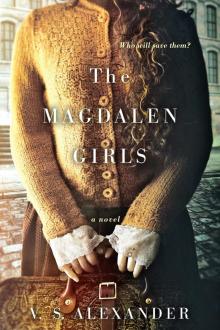- Home
- V. S. Alexander
The Irishman's Daughter Page 35
The Irishman's Daughter Read online
Page 35
“Of course,” he said. “I wish you the best of luck with your sister. Perhaps Lucinda will want to stay on at the Newton on Beacon, but I wouldn’t wager on it.” He ruffled the boy’s hair and then left the room.
She turned to the boy. “Mr. Peters is going to keep your money in the company safe and take care of you until I can get a new home for us.” She coaxed the money from him, placed it on her lap, and folded his hands between hers. “This is what your mother wanted—it’s what she asked of me, and I’m going to honor her wishes.”
The small, pale fingers grasped hers, and her heart swelled with joy because she knew that Addy was watching over both of them.
Quinlin seemed to sense something too, for his small voice cracked. “My mother told me that you saved me from dying.” He threaded his warm fingers through hers. “I never had a chance to thank you.”
She hugged him as her tears spilled down her cheeks. “You’re welcome.”
* * *
Lucinda left her shift at the Carlisles’ in a foul mood. Another young woman in their employ had sent a message saying she was sick with a cold and wouldn’t be at work. Therefore she’d been expected to clean and wash and help in the kitchen, taking on many extraneous duties in addition to her regularly assigned work.
The night was cold and the heavens seemed without stars as she trudged down Charles Street. The wind whistled past her ears and threatened to pull her hat off her head and fling her coat from her body. She held on to it with one hand and with the other grasped what objects she could to keep from losing her balance on the uneven brick walk.
Out of the corner of her eye, she happened to catch sight of three men standing in a dark alleyway. There were many such hiding places nestled among the narrow streets of Boston, and she had learned to keep her keen attention on them now that fall had shortened the daylight hours. She couldn’t see their faces, but their presence provoked a tingle of fear along her spine. She could feel their eyes upon her.
As if to confirm her fears, one of the three—a large man wearing an overcoat and a muffler that concealed half his face—emerged from the shadows and kept in step behind her. She pushed harder into the wind, but at another narrow alleyway he grabbed her from behind and shoved her into the dark passageway.
She balled her fists and pummeled his thick chest. “What do you want?”
He pressed against her. She was on the verge of screaming when cold metal pressed into her neck.
“I’d be quiet if I were you, little lady, or you might end up dead.” The man’s voice was masked by the cloth over his mouth, and she could see little of him in the dark.
“How dare you touch me,” she said. “Let me go.”
His hand smacked her cheek, causing her to see stars. The right side of her head slammed against the rough brick wall.
“I told you to shut up,” the man said. “Next time . . .” The knife pressed deeper against her neck. “All we want is the money that’s ours. Simple as that. We know you live with the woman who took the boy away. Addy Gallagher had money that belonged to us. Deliver it to the old woman where Addy lived by tomorrow night—and don’t go to the police—otherwise . . .” He grabbed a lock of hair that protruded from under her hat and with a flick of the knife sliced it off. The man shoved the hair into her hand. “A little souvenir to remind you of what you have to do.” He pushed away and strolled out the way he had come.
Lucinda brought her trembling arms up to her chest and placed her hands over her throat. Her legs buckled against the wall, and she slid down to the damp earth. It took several minutes for her breathing to return to normal; still, her legs refused to move. Finally she clawed her way up the wall and forced herself to the street. A few men walked by without a look as she brushed the mud from her coat. She tucked her hair under her hat and walked to the boarding house, a trip of a few minutes that seemed like hours. She passed a policeman on the way but kept her distance in case the man who had assaulted her was watching.
The eyes of the young woman working at the desk widened when she walked in. Lucinda said nothing but continued up the stairs to the room.
When she opened the door, Briana was sitting on the bed. Her sister gasped and ran to her side, barraging her with questions. Before she recounted her encounter with a man she was certain was one of the Carson brothers, she took off her coat and walked to the bathroom at the end of the hall. There, the looking glass over the sink reflected the red finger marks on her left cheek from the blow and the bleeding scrapes on her right from striking the wall. She threw cold water on her face and tamped down her anger, for had her sister not gotten involved with Addy Gallagher their lives wouldn’t be in danger.
CHAPTER 20
“We are marked women!” Lucinda retrieved the lock of hair from her coat pocket and threw it on her bed. “This is what we have to look forward to—a fate like Addy Gallagher’s.” She drew a line across her throat with her finger. “This is where he put the knife. This would never have happened had you stayed away like I asked.” Lucinda collapsed on the mattress.
Her sister was right—Briana had not foreseen the trouble her compassion for Addy and Quinlin would cause.
She rose from her bed and sat beside her sister. “I’m sorry. Let me look at you.” She turned her sister’s face gently toward her. Her left cheek still bore the red discoloration from the man’s fingers. The scrapes on the other side of the face were superficial, but Briana was certain they stung. “There’s ointment in the medicine chest in the bathroom. I’ll get it for you before we go to bed.”
The picture of Addy’s body, her throat still bleeding from the wound, floated through Briana’s mind like a feather blown from a seabird. The visage horrified her, but there was a strange finality to the image as if fate had intervened between them. But what would be the reason for their meeting? To alienate her sister? To save the boy? The answer wasn’t clear.
She traced her fingers across the bruises on Lucinda’s face as the specter faded. “I’m sorry for the trouble I’ve caused. I thought I was doing what was right.” Now she wasn’t so sure. Even the bank notes could be a problem if they didn’t deliver them to the old woman. She rejected that idea, because the thought of giving up the money—for all their sakes—was too much to bear. “We must go to the police,” Briana urged.
Lucinda harrumphed. “Yes, but they won’t be able to watch us twenty-four hours a day, and, I suspect, they will care even less what happens to us or the child when they find out that Addy was a . . .” She shook her head. “It’s too sordid.”
“You might change your mind when you hear what I have to say,” Briana said, and told Lucinda about her meeting with Quinlin and the money that he had carried out of the house.
Lucinda’s eyes brightened when Briana came to the boy’s treasure.
“See, we must go to the police,” Briana said after she had finished her story. “Now is the time to move in with the Colemans. The Carson brothers know we live here.”
“Many times I’ve cursed the day I came to America. Many times I’ve thought I should have stayed in Ireland, or traveled to Manchester and thrown myself at the mercy of Sir Thomas.” Tears trickled down her cheeks. “Now this attack.” She looked down at her trembling hands, revealing a sad vulnerability that touched Briana.
“We’ve had our differences, but I love you.” Briana leaned against her sister’s shoulder. “We’ll be stronger together than apart with your help and comfort.” They hugged each other with a vigor Briana had not experienced for many years.
“Do you think we should move?” Briana asked.
“After tonight, I’m in agreement,” Lucinda replied, and dried her tears. “The money does make things brighter . . . for us and Quinlin.”
“Oh, thank you, sister! I’m sure it’s the right thing for us.” She raced to her bed and pulled down the blanket. “There’s so much to do!”
A string of tasks ran through her head. She would contact the police and Declan Coleman, pa
ck, get the boy, and move into a new home. She would have to take another day off from work, but she was certain Mr. Peters would understand. Certainly the Carlisles would allow Lucinda at least part of the day off in light of the attack. The immensity of it all was enough to set her nerves jangling.
As she pulled up the blanket, her sister asked, “Aren’t you forgetting something?”
Briana rolled over toward her sister with a puzzled look on her face.
“The ointment,” Lucinda said with a grin.
She rolled out of bed, honoring her promise to her sister, certain that tomorrow would be a better day.
* * *
The police sergeant sat with them in a secluded corner of the drawing room at the back of the boarding house. He took notes in a small book and nodded and hummed as Lucinda told her story. He was of Scandinavian descent with a bushy blond mustache and muttonchops, tall and wiry, but with a florid face, indicating he spent a great deal of time outdoors.
The casual approach of the sergeant’s questioning about the attack shifted when Lucinda mentioned the Carson brothers as possible suspects. Neither of them had mentioned the murder of Addy Gallagher. The officer looked around the room and then stopped writing in his notebook.
“What’s the matter?” Briana asked. “Something bothering your hand?”
“The Carson brothers are well known to me and the district force,” he said with a note of disdain. “I’m sure you must be mistaken.”
“Oh,” Briana said, anger causing her voice to rise. “Is that why no one has questioned me about Addy Gallagher’s murder? She died in my arms from a brutal beating and a knife wound to the throat after being threatened by the same man who probably accosted my sister—yet the Carsons are fine, upstanding men?”
The sergeant frowned, closed his notebook, and lowered his voice. “Addy Gallagher was a woman of ill repute, and that, ladies, is putting it delicately. It would be wise for both of you to go on with your lives and let the district police investigate both crimes.”
“Investigate?” Briana asked. “It appears that it would be wise for us to keep our mouths shut and remove ourselves from the whole affair. Am I right?”
The officer’s lips curled into a smirk. “You seem to be a smart lass.”
The hackles rose on Briana’s neck. It was one thing for her to be called a “lass” in Ireland but another to be addressed so in Boston by a son of Nordic immigrants.
Underneath the bruises and welts, Lucinda’s face flushed crimson. “And if we are to keep our mouths shut, how are we to protect ourselves if the police feel these men can do no wrong?”
He placed his notebook and pencil in his uniform pocket and glanced about the room to see if anyone was eavesdropping. “I would say that twenty-five dollars would ensure your protection, and I’m certain the Carsons would feel the same about staying out of your way. Such good men wouldn’t want their names besmirched by unsubstantiated charges of assault . . . and murder.” He leaned back in his chair and smiled.
The choice was clear. The Carsons and the district police were quid pro quo, and it would do no good to pursue accusations they couldn’t prove. For their own safety, they would have to comply with bribery and get the money from the safe. “Meet me outside the Peters Building Trades at three this afternoon. You’ll get your money.” Briana didn’t want the officer to know the money was being held there.
Lucinda’s eyes widened, but she said nothing.
“Good, I’ll consider the case closed,” the officer said. He rose from his chair and bowed slightly. “Good morning, ladies.” He tipped his hat. “I’ll see you at three, Mrs. Caulfield.”
After the officer left, Lucinda turned to her. “I can’t believe we have stooped so low.” She shook her head in disgust.
The whole affair was obvious to Briana. “It’s all about money, isn’t it—here in America, in Ireland, and the English government with their hands-off politics?”
Lucinda folded her hands as a thoughtful look crossed her face. “You’re right, as much as I’d rather deny it. Why isn’t more being done to help Ireland? Why did Addy Gallagher have to die? It is all about money.”
Briana rose from her chair. “You have a job to go to, and I must make arrangements for us to move to the Colemans’.”
Lucinda stood, moved a hand across her bruised face. “We do need each other.”
She hugged her sister. “See if you can get the afternoon off, or at least leave early. It’s time we left this boarding house. We’ve only a few days left in the month anyway.” She laughed. “I think the Newton on Beacon will be happy to be rid of us.”
“I think you’re right.” Lucinda grasped her hands. “By the way . . . twenty-five dollars well spent—let’s hope.”
* * *
A flurry of arrangements took up her day.
Briana was able to reach Declan Coleman through Mr. Peters. Declan was thrilled to know that they would be moving in, because his sisters were unable to book passage from Ireland. Their rent would help with household expenses in South Cove. The sergeant arrived outside the office promptly at three to collect the money, which she took from Quinlin’s bank notes, along with extra for a cab, promising herself to pay it back to the boy. The officer assured her that the Carson brothers would leave them alone because he had secured their “safety after a mutual agreement.”
She left work early to pack their things and then informed the proprietress that they would be leaving after dinner. The woman was unconcerned because she now had the rent paid on a room she might let before the end of the month.
Lucinda arrived at the boarding house at four, and after dinner they loaded their belongings in a carriage, picked up Quinlin from the Peterses, and headed to South Cove.
The Colemans greeted them at the door of their modest brick building. Her hands strained with her bags, but her exhaustion was temporarily overcome by the hope of a new start. Mrs. Aletha Coleman, a short, pretty woman of Greek descent with a narrow face and long black tresses, showed them around the house.
To Briana, the home seemed a welcoming fortress. After climbing up a set of wooden stairs at the entrance, a narrow hallway opened up before them. The first floor held a sparsely decorated living room with a cheery wood-burning fireplace, while a second room on the rear served as their bedroom. An outside alley led to the kitchen below the first floor. The room contained a coal-burning stove and an old maple dining table, and the space smelled of smoke and spices. Outside, a wooden privy stood against the brick wall.
Aletha led them to the second floor—their bedroom, with two single beds and a rectangular sack stuffed with straw that would serve as the boy’s bed. The fireplace was stoked with birch logs, which sent out a warm and welcoming light. A small desk and chair sat near two windows at the front of the room.
The Colemans soon left them, but not before saying the kitchen was theirs to use when they wished, as was their living room. Declan indicated that if their privacy became an issue, the boy might have the third floor, which was currently used for storage, until his sisters arrived in Boston next spring.
“Well, what do you think?” Briana asked her sister after the couple had gone downstairs. Quinlin curled up on his bed and watched the logs crackle in the fireplace.
“It’s not Lear House,” Lucinda said, “but I think it’s a dream come true.” She rubbed her hands over her arms and shoulders, luxuriating in the warmth of the fire. “How I wish Father—and Rory—were here.” The smile she had worn moments earlier disappeared. “I’ve hardly had time to worry about them, but when we sit in such luxury, I can’t help but think about them.”
“I feel the same way,” Briana said. The house was grand compared to the conditions her husband and father might be living in at this moment in Ireland. She looked glumly into the fire and tried to think of something to cheer her. One positive thought struck her, though not exactly a happy one.
“I didn’t tell you what I saw this afternoon,” she said to her si
ster.
Lucinda eagerly looked her way.
“I went inside and watched from the window when our police sergeant left,” Briana continued. “He was so brazen about it.”
“About what?” Lucinda asked with a studied gaze that lighted upon her.
Briana lowered her voice to keep Quinlin from hearing. “He walked to the corner of the green across the street—perhaps he thought I couldn’t see him, for he was partially hidden behind a tree—but he gave the twenty-five dollars to a man we know.”
“One of the Carson brothers?”
“No—Romero Esperanza. It was Romero, all right—wearing the same gambler’s hat and tailored overcoat. He must be the Carson brothers’ boss. Addy said she’d never met the man, but it makes sense.”
Lucinda shuddered. “Well, let’s hope that’s the end of it and we never see any of them again.”
Briana walked to the fire, stood beside it, and rubbed her hands in its warm rays. “There are only two people I want desperately to see again, and you know who they are.” She supported herself against the fireplace mantel and slid to her knees because it was hard to maneuver with a swollen belly. The light played over her in flickering shadows as she sat on the boy’s bed and stroked his red hair. It needed trimming, that is, if he would allow her to do it. He curled up beside her. She snuggled against him and wondered how Rory would feel about adding an older son to his name.
Another thought on her mind was writing a letter to her father, and thus to Rory. She doubted it would get to Brian before March or April, but the idea reinforced her hope that they were both still alive. When she put pen to paper, she would have much to tell him.
* * *
Clouds lingered over the campground the morning after the raid as the sun struggled to cut through the overcast. The Nephin Beg range lay dark in the eastern shadows. Orange and some of the Mollies inspected the grain and goods that remained in the curraghs. Others prepared to offload and transport the rest by hand or in makeshift barrow carts to a sympathizer’s farm near Geesala at the northeastern tip of the peninsula. Rory chose to go with the latter because he needed to get back to Brian at the Kilbanes’ cottage.

 The Irishman's Daughter
The Irishman's Daughter The Sculptress
The Sculptress The Taster
The Taster Her Hidden Life
Her Hidden Life The Magdalen Girls
The Magdalen Girls